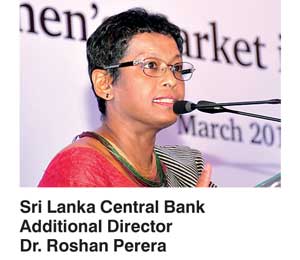Tuesday Feb 24, 2026
Tuesday Feb 24, 2026
Thursday, 15 March 2018 00:00 - - {{hitsCtrl.values.hits}}
By Shannon Jayawardena
The role of women in the Sri Lankan economy remains relatively low and static, said Central Bank Additional Director Dr. Roshan Perera at the IFC-CB Policy Forum held on 12 March at the Hilton Hotel.
Speaking on women’s financial inclusion and the Sri Lankan Policy Framework Dr. Perera stated that: “According to the labour force survey conducted by the Department of Census and Statistics 54.3% of the working population above the age of 15 are women; however only 35.5% of these women are engaged in the labour force. That’s a very small percentage compared to men. Therefore the unemployment rate is relatively low as well.”
She noted that the main reason for the lack of women participation in the labour force was 77.3% being heavily engaged in family work but only 23% households are headed by females. Likewise in banks 12.6% of board directors are women while only 18.5% of the key management staff are women. Thereby, Dr. Perera emphasised on the fact that women participation in all sectors are extremely low.
“There’s a huge disparity with regards to the reason as to why females remain out of the labour force. The highest labour force participation is recorded in the Nuwara-Eliya district, reflecting high participation of women in the plantation sector and informal sector activities. Women are the main economic activists and should be included a lot more in the formal sector.”
Women often do not have access to financial services and are faced with many challenges such as the lack of collateral, low level of financial literacy, geographic distance from financial inclusions, concentration in low paying economic activities and so forth.
Likewise on the supply side they are faced with the lack of gender disaggregated data, lack of project based evaluation processes, inappropriate products, regulatory and social barriers and the risk aversions of banks.
Dr. Perera stated that: “There is huge potential in women participation and if you look at some institutions they have tapped it very successfully. Participation of women in a decision making level both in terms of financial institutes and household levels are equally important. Women must be empowered with the confidence to deal with the formal sector.”
“There are many studies that have shown that the return from these interventions are very high in terms of giving some kind of business or entrepreneurship education to women in addition to roles that they are provided with,” she added.
Pic by Lasantha Kumara